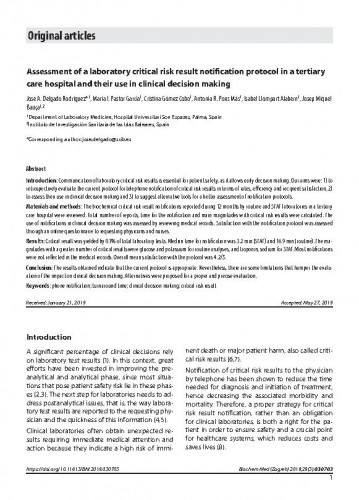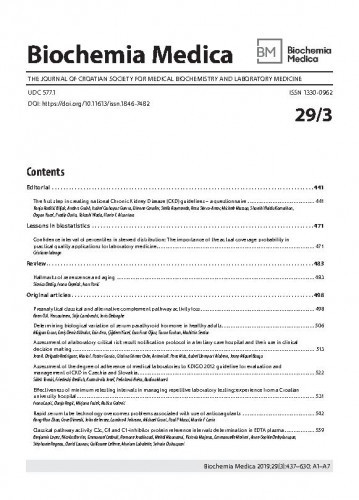Communication of laboratory critical risk results is essential for patient safety, as it allows early decision making. Our aims were: 1) toretrospectively evaluate the current protocol for telephone notification of critical risk results in terms of rates, efficiency and recipient satisfaction, 2)to assess their use in clinical decision making and 3) to suggest alternative tools for a better assessment of notification protocols.Materials and methods: The biochemical critical risk result notifications reported during 12 months by routine and STAT laboratories in a tertiarycare hospital were reviewed. Total number of reports, time for the notification and main magnitudes with critical risk results were calculated. Theuse of notifications in clinical decision making was assessed by reviewing medical records. Satisfaction with the notification protocol was assessedthrough an online questionnaire to requesting physicians and nurses.Results: Critical result was yielded by 0.1% of total laboratory tests. Median time for notification was 3.2 min (STAT) and 16.9 min (routine). The magnitudeswith a greater number of critical results were glucose and potassium for routine analyses, and troponin, sodium for STAT. Most notificationswere not reflected in the medical records. Overall mean satisfaction with the protocol was 4.2/5.Conclusion: The results obtained indicate that the current protocol is appropriate. Nevertheless, there are some limitations that hamper the evaluationof the impact on clinical decision making. Alternatives were proposed for a proper and precise evaluation.
Sažetak

 Biochemia medica : the journal of Croatian Society for Medical Biochemistry and Laboratory Medicine : 29,3(2019) / glavna i odgovorna urednica Daria Pašalić.
Biochemia medica : the journal of Croatian Society for Medical Biochemistry and Laboratory Medicine : 29,3(2019) / glavna i odgovorna urednica Daria Pašalić.